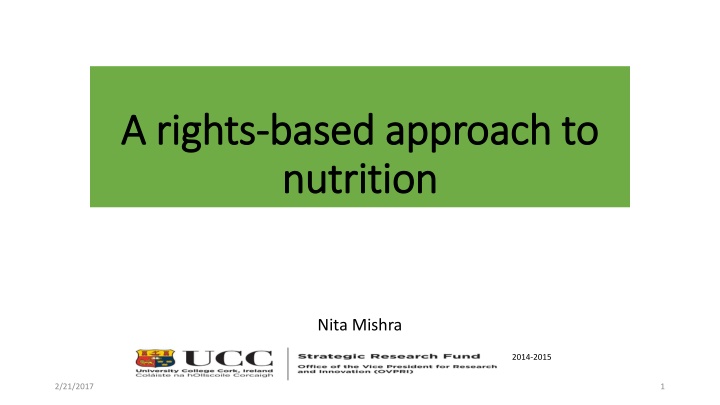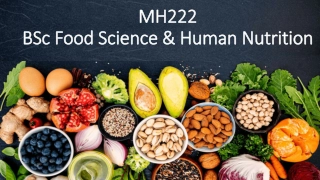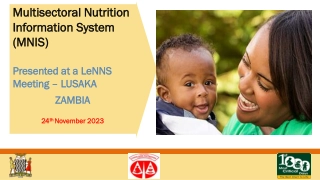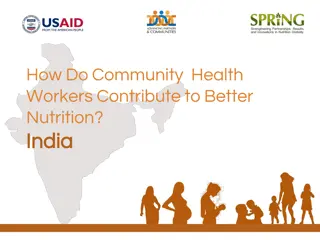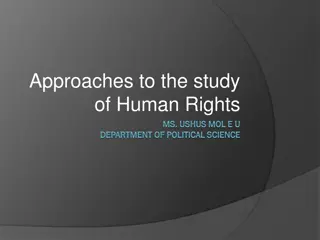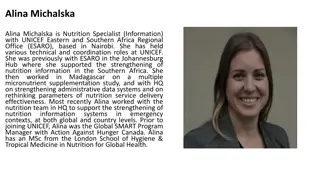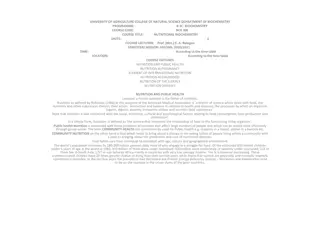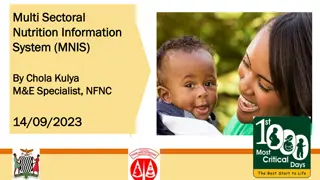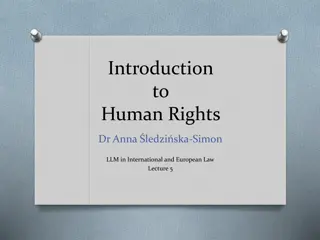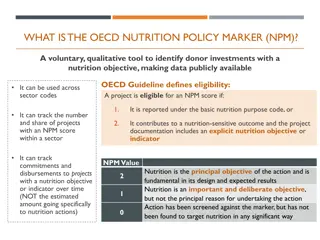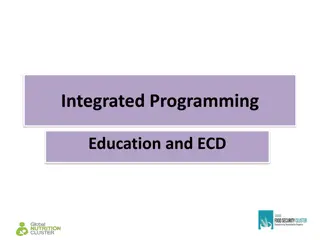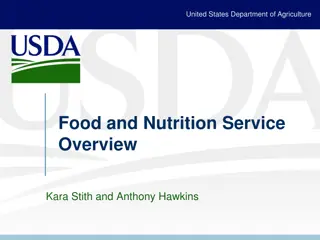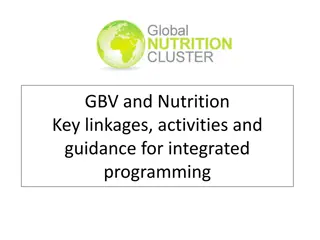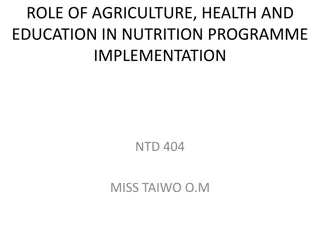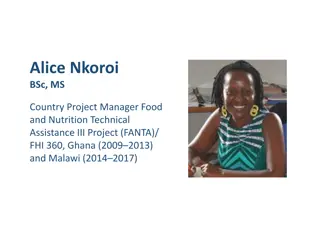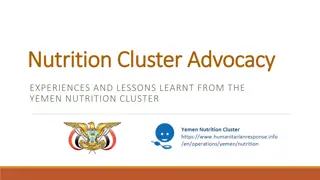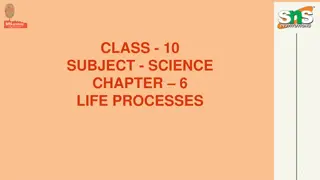A rights-based approach to nutrition
In this presentation, Nita Mishra discusses the importance of a rights-based approach to nutrition, focusing on governance structures and emerging concerns. The content includes information on the Second International Conference on Nutrition (ICN2) and a student interactive session on sustainable food systems.
Download Presentation

Please find below an Image/Link to download the presentation.
The content on the website is provided AS IS for your information and personal use only. It may not be sold, licensed, or shared on other websites without obtaining consent from the author.If you encounter any issues during the download, it is possible that the publisher has removed the file from their server.
You are allowed to download the files provided on this website for personal or commercial use, subject to the condition that they are used lawfully. All files are the property of their respective owners.
The content on the website is provided AS IS for your information and personal use only. It may not be sold, licensed, or shared on other websites without obtaining consent from the author.
E N D
Presentation Transcript
A rights A rights- -based approach to based approach to nutrition nutrition Nita Mishra 2014-2015 Nita Mishra, PhD Student, Food Business and Development, UCC 2/21/2017 1
Why we are here Why we are here Reasons for meeting today FAO- students engaged worldwide UN decade for nutrition The IFIAD nutrition and agriculture group Reasons for this presentation on RBA- examining governance structures Perhaps being ignored with all the fuss around nutrition per se My study Nutrition is a small component, and emerging concern as findings shows Interested in the State Nita Mishra, PhD Student, Food Business and Development, UCC 2/21/2017 2
http://www.fao.org/documents/card/en/c/50ec9968-742f- 4fee-a35f-e6f413130a72/ Report of the Joint FAO/WHO Secretariat on the Conference The Second International Conference on Nutrition (ICN2) , co - organized by the Food and Agriculture Organization of the United Nations (FAO) and the World Health Organization (WHO), was held at the Headquarters of FAO in Rome, Italy , from 19 to 21 November 2014. The Conference was convened to (i) review progress made since the 1992 International Conference on Nutrition, respond to new challenges and opportunities, and identify policy options for improving nutrition; (ii) bring food, agriculture, he alth and other sectors together and align their sectoral policies to improve nutrition in a sustainable manner; (iii) propose adaptable policy options and institutional frameworks that can adequately address major nutrition challenges in the foreseeable fu ture; (iv) encourage greater political and policy coherence, alignment, coordination and cooperation among food, agriculture, health and other sectors; (v) mobilize the political will and resources to improve nutrition; and (vi) identify priorities for int ernational cooperation on nutrition in the near and medium terms. Nita Mishra, PhD Student, Food Business and Development, UCC 2/21/2017 3
http://www.fao.org/about/meetings/sustainable-food-systems- nutrition-symposium/student-session/en/ Students interactive session: bringing fresh perspectives; This special session allowed students from different regions of the world to convey their views to policy and decision makers on ways to strengthen sustainable food systems for healthy diets and improved nutrition. Friday 2 December 2016, (Sheikh Zayed Centre, FAO headquarters) Participating universities from all regions connected in a video conference for the session, while their Students Representatives physically attended the session in Rome to convey messages on behalf of their fellow students, and discuss with a panel of international experts. The participating universities were: University of Sao Paolo, Brazil;University of Ghana, Ghana; Chouaib Doukkali, University Morocco;Mahidol University, Thailand; Oslo-Akershus University College of Applied Sciences, Norway; Tufts University, USA; Universit degli Studi di Roma Tre, Italy; andUniversity of Ghent, Belgium. Nita Mishra, PhD Student, Food Business and Development, UCC 2/21/2017 4
UN Decade of Action on Nutrition (2016 UN Decade of Action on Nutrition (2016- -2025 2025) ) UN Decade of Action on Nutrition (2016-2025): adopted by the General Assembly on 1 April 2016 The United Nations General Assembly today proclaimed a UN Decade of Action on Nutrition that will run from 2016 to 2025. The resolution calls upon FAO and WHO to lead the implementation of the Decade of Action on Nutrition in collaboration with the World Food Programme (WFP), the International Fund for Agricultural Development (IFAD) and the United Nations Children's Fund (UNICEF), and involving coordination mechanisms such as the United Nations System Standing Committee on Nutrition (UNSCN) and multi-stakeholder platforms such as the Committee on World Food Security (CFS). Nita Mishra, PhD Student, Food Business and Development, UCC 2/21/2017 5
What is a rights What is a rights- -based approach to based approach to development development A human rights-based approach is a conceptual framework for the process of human development that is normatively based on international human rights standards and operationally directed to promoting and protecting human rights. It seeks to analyze inequalities which lie at the heart of development problems and redress discriminatory practices and unjust distributions of power that impede development progress. Nita Mishra, PhD Student, Food Business and Development, UCC 2/21/2017 6
So what are RBAs? 3 basic features characterise RBAs: (a) legal basis; (b) normative framework; and (c) the process itself 6 key principles guide practitioners and policy makers: universalism and inalienability; equality and non discrimination; indivisibility and inter dependence of HR; participation and inclusion; accountability; and rule of law. Nita Mishra, PhD Student, Food Business and Development, UCC 2/21/2017 7
Rights based efforts Changes in structures legal/civil/political/ socio- economic{democratic processes) Duty bearers- fulfil their obligations towards rights holders{strengthen accountability of duty bearers} Rights holders; demand their rights from duty bearers{support right holders in demanding rights} Change in people s lives: attitudes, empowerment; human rights realised{vulnerability/poverty reduction} Nita Mishra, PhD Student, Food Business and Development, UCC 2/21/2017 8
Rights Rights- -based processes based processes Common indicators for both (State and Civil Society) 1. Analysis of root causes of vulnerabilities, inequalities and power dynamics 2. Building sustainable community capacities to enable decision making and claiming rights 3. Ensure accountability and active engagement of duty bearers 4. Advocacy for sustainable changes in policy and practice 5. Alliance building and networking 6. Working at multiple levels Nita Mishra, PhD Student, Food Business and Development, UCC 2/21/2017 9
Value added by RBA Attention to exclusion, disparities, injustice Addresses basic causes of problems Interdisciplinary approaches; holistic Looks at legal and institutional reforms and enriches the national policy review process An international monitoring mechanism is in place Nita Mishra, PhD Student, Food Business and Development, UCC 2/21/2017 10
What should we be looking at in a rights What should we be looking at in a rights- -based approach to nutrition? approach to nutrition? based I have taken the indicator of Political will and commitment whereby I have examined (HANCI study. See te Lintelo, Haddad et al, 2012) -legal frameworks (fundamental rights, the NFSA) -policies (the ICDS, PDS, MDMS, Agricultural subsidies, food systems) -budget (not in my study)- (see chapter print on HANCI for further discussions) Nita Mishra, PhD Student, Food Business and Development, UCC 2/21/2017 11
THE national food security act (NFSA) 2013 THE national food security act (NFSA) 2013 The provisions for nutrition in the NFSA See the chapter printout on why NFSA is rights- based Various other programs such as the adolescent years etc A rights-based approach Nita Mishra, PhD Student, Food Business and Development, UCC 2/21/2017 12
The Integrated Child Development Services The Integrated Child Development Services Focus on the ICDS Provisions Shortcomings according to studies (Kapil et al, 2002) Mamata program in Odisha Nita Mishra, PhD Student, Food Business and Development, UCC 2/21/2017 13
The SNP The SNP Findings from my broader suggest that the state is increasingly focusing on nutritional aspects in its approach to the right to food Examine the Supplementary Nutrition Program (print out) The food item mix Various provisions indicating governance structures are being put into place Is that enough? Nita Mishra, PhD Student, Food Business and Development, UCC 2/21/2017 14
References References http://www.righttofoodcampaign.in/pre-school-nutrition/articles https://docs.google.com/viewer?a=v&pid=sites&srcid=ZGVmYXVsdGRvbW FpbnxoYXFyb3ppcm90aXxneDoxNDRmYmI2NWNjNWE0ODNj Kapil, U. 2002, Integrated Child Development Services (ICDS) scheme: a program for holistic development of children in India in the Indian J Pediatr. 2002 Jul;69 (7):597-601. http://www.ncbi.nlm.nih.gov/pubmed/12173700 Kapil U, Pradhan R., 1999, Integrated Child Development Services scheme (ICDS) and its impact on nutritional status of children in India and recent initiatives in Indian J Public Health. 1999 Jan-Mar; 43 (1):21-5. http://www.ncbi.nlm.nih.gov/pubmed/11243083 Mikkelsen, B. 2005. Methods for Development Work and Research: A New Guide for Practitioners, Sage Publications: New York, pp 384 Nita Mishra, PhD Student, Food Business and Development, UCC 2/21/2017 15
